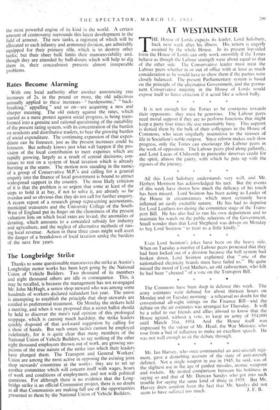Rates Become Alarming
With one local authority after another announcing rate increases of 2s. in the pound or more, the old adjectives annually applied to these increases—" burdensome," "back- breaking," appalling" and so on—are acquiring a new and sharper meaning. The old outcry against the rates, which started as a mere protest against social progress, is being trans- formed into a genuine and rational questioning of the suitability of the present rating system, with its concentration of the burden on residents and distributive traders, to bear the growing burden of social expenditure. The continuing expansion of that expen- diture can be foreseen, just as the present increases could be foreseen. But nobody knows just what will happen if the pro- vision of the local contribution to meet expenses which are rapidly growing, largely as a result of central decisions, con- tinues to rest on a system of local taxation which is already bursting at the seams. The motion now standing in the names • of a group of Conservative M.P.'s and calling for a general enquiry into the finance of local government is bound to attract widespread support in the country. The most likely criticism of it is that the problem is so urgent that some at least of the steps to hold it at bay, if not to solve it, are already so far overdue and so obvious that they do not call for further enquiry. A recent report of a research group representing accountants, municipal treasurers and the University College of the South- West of England put its finger on the clumsiness of the present valuation lists on which local rates are levied, the anomalies of derating, which amounts to a concealed subsidy for industry and agriculture, and the neglect of alternative methods of rais- ing local revenue. Action in these three cases might well avert the danger of a breakdown of local taxation under the burdens of the next few_ years.


































 Previous page
Previous page